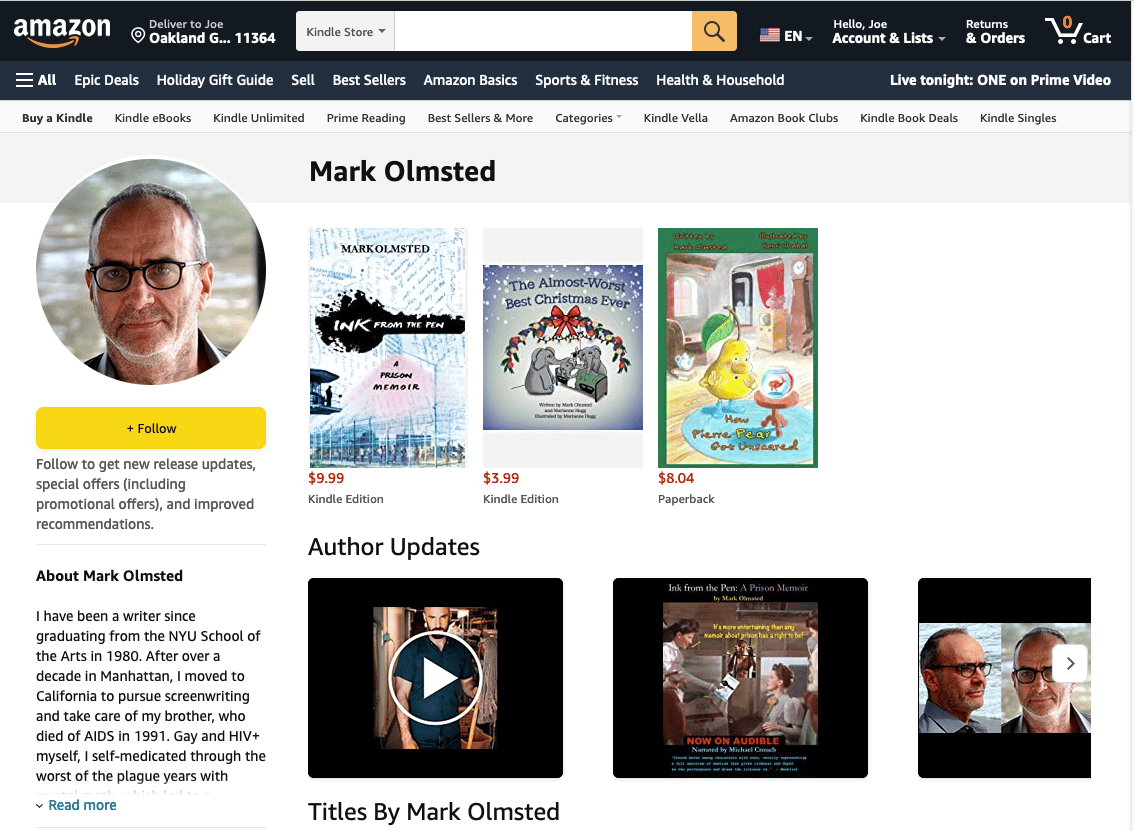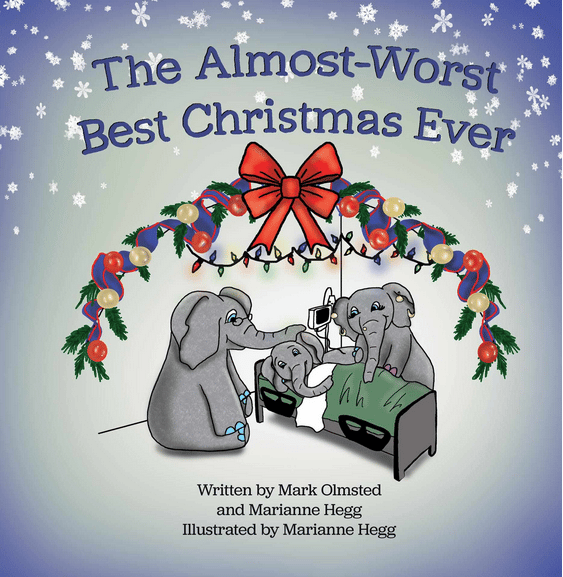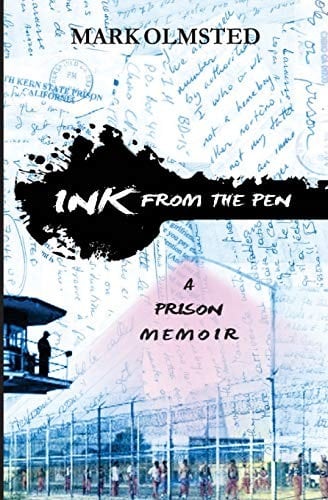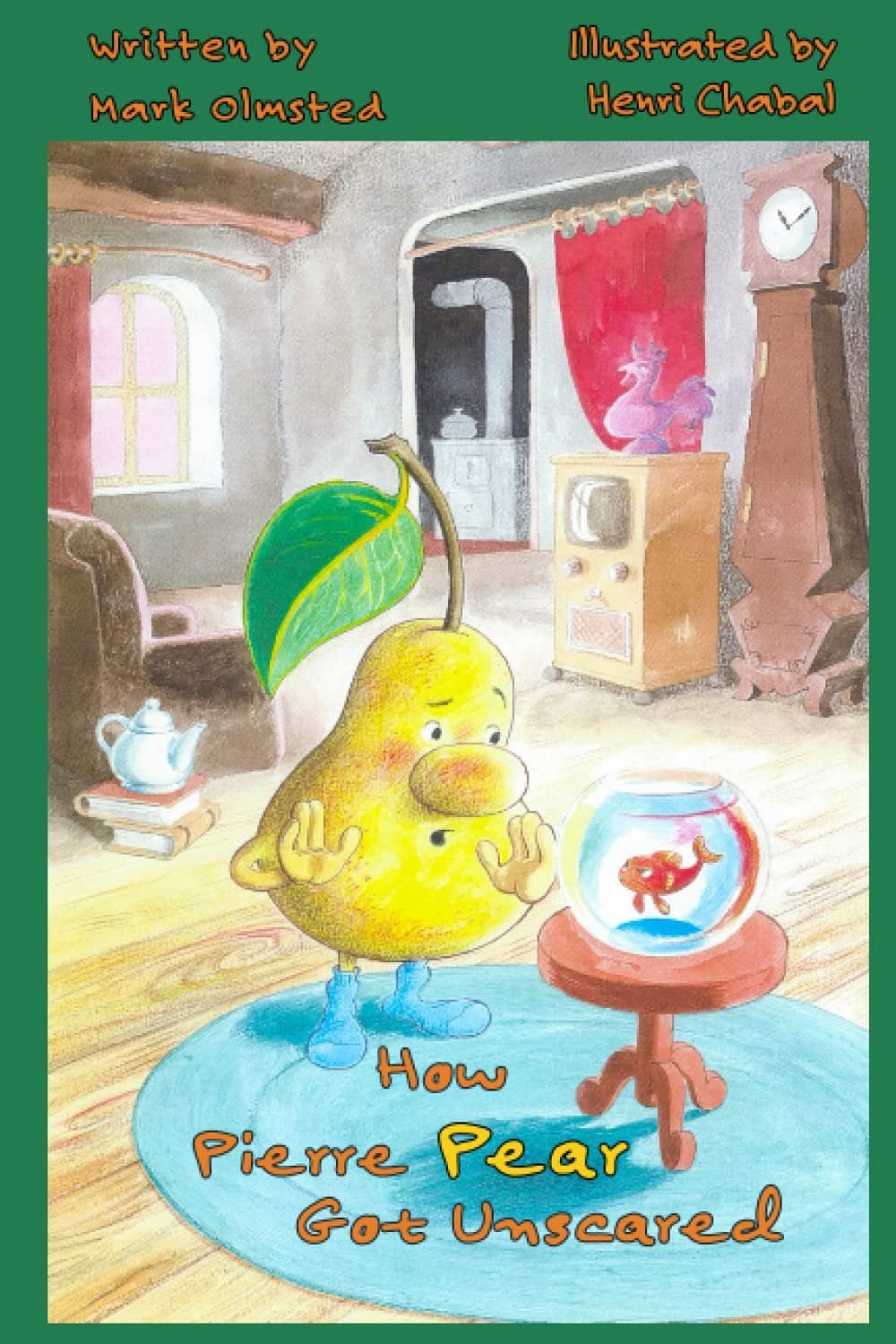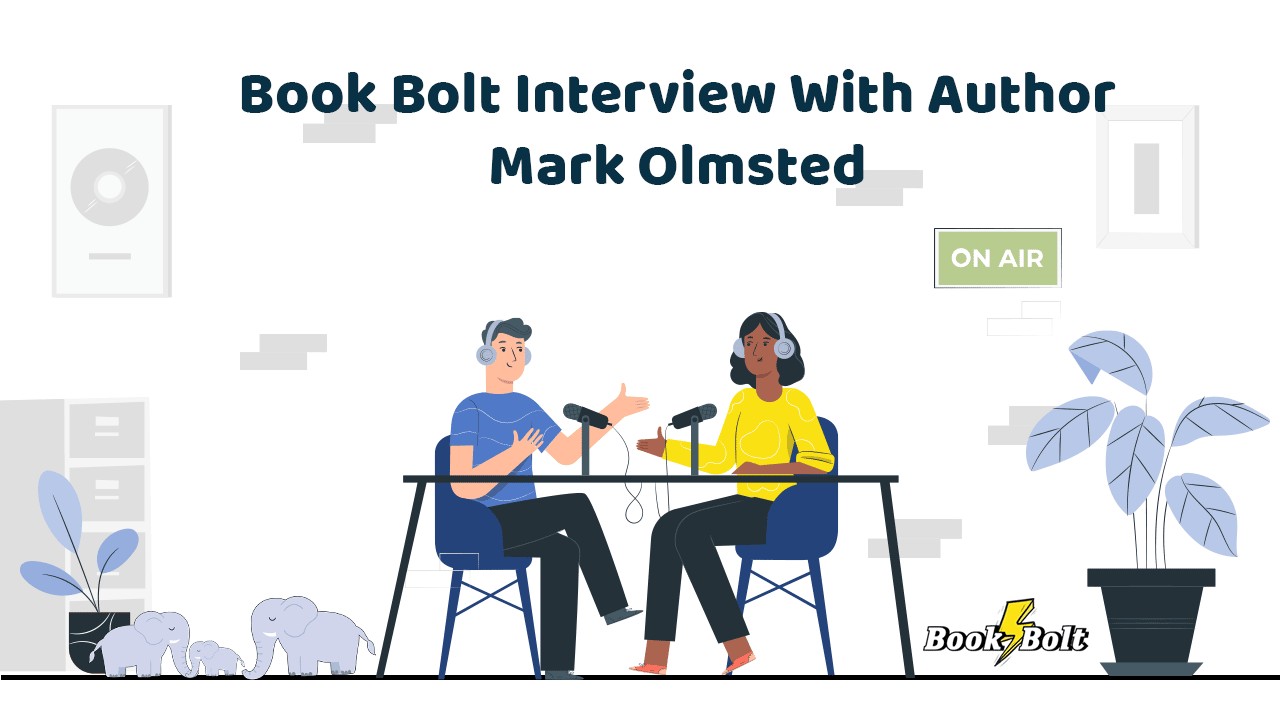
If you are thinking about self-publishing your work through a service like KDP, you’re probably wondering about the experiences of people who were once starting out just like you. Did they have the same setbacks? Did it all work out for them?
In our continuing series of articles interviewing such authors, we today turn to Mark Olmsted who has been using KDP as a platform. Mark had never sold hardcopy books through a publisher before KDP, nor had he sold any through traditional brick-and-mortar outlets, but that did not stop him from releasing two complete works: “Ink from the Pen”, and the children’s book “How Pierre the Pear Got Unscared”, in English and French versions.
How Mark Creates A “Publishable” Book
When asked about his process of managing a project, and if he does it all himself, he’s clear that he has a good group behind him. “I have a circle of trusted friends who proof, copy edit, and made notes on my work for free. My sister Sandra is a graphic designer with an expert knowledge of Adobe InDesign, and she has spared me the difficulties of formatting and uploading.
“These were also done in collaboration with my sister,” he said when asked about designs for his covers and interiors, “I have some graphics art talent myself, and generated most of the ideas, which my sister finessed and perfected. We must have designed at least 40 covers before settling on the final one. (For the children’s book, the cover was done by my illustrator cousin.)”
On the topic of his target audience, he explained to us that he’s “Only put out one book for adults and one for children, so those audiences don’t overlap. For Ink, I’ve tended to aim for gay male, college-educated readers, but I’ve probably sold more copies to liberal women over 40 who tend to friend me on Facebook and also be marvelously supportive– posting about the book and generating new sales. I have organically developed many of those friendships for years, so can’t say I “targeted” them.
No Publisher? Why Not Self-Publish?
When we then asked what brought him to KDP and what his overall opinion of KDP as it pertains to his work was, he told us, “I was in the my late 50s, not getting any response from book agents, and saw publishing it myself as my only realistic alternative. I am impressed by the mechanics of it all, and the control it affords me. But the profit margins are low, particularly the kindle per page read. I find it frustrating that we don’t have access to the names and email addresses of purchasers of our books, or even demographic information to know who’s buying it. Although it could be that I just haven’t spent enough time investigating web services that might provide that information for me. I still hold out hope that my next book might find a traditional publisher, but if not, I will use KDP again. I have three books started, and intend to publish one in 2023, one in 2024, and the next in 2025.”
“Write What You Know” – No Matter How Dark
Mark was quite open during our interview about the darker events in his personal life, and we naturally wanted to know more about his journey.
In particular, we wished to know more about what it was about his experience while in the incarceration system that made him feel his story would resonate with others. “At the risk of penning a lengthy epic, the story behind my book is a very big, very improbable one spanning decades, and I don’t know how to tell it without telling all of it. I have always been a writer, but after making a successful short film at NYU in my senior year about coming out to my mother, decided to focus my efforts on screenwriting. I shopped a script around Hollywood in the early 90s that came quite close to being made, but two directors in a row died – one of lung cancer, the other of AIDS, and to say a crucial momentum was lost is an understatement. In the same 5-year span when I was trying to get the script made, the death toll from AIDS was also at its worst. My brother (also gay) was the first of ten close friends to die, all while I was grappling with my own diagnosis.
“The professional disappointment and the unrelenting grief, combined with the certainty of my own impending death, led me to make a lot of choices I never would have otherwise have made, including stealing my dead brother’s identity and credit, doing drugs and selling them, and eventually even forging my own death certificate. When the miracle cocktails became available, my drug addiction was so well entrenched it created a toxic momentum I couldn’t manage to reverse, despite the first real hope I might survive AIDS. I did go back to work as a magazine editor for a year, though, and became adept at short form essay and article-writing. I always had folders full of notes for various novels, but found it easier to write poetry, as a full-length book felt too risky to invest my time in.
“In 2004, everything came crashing down when I was arrested for fraud, forgery, and selling narcotics, and I ended up serving 9 months of a 16-month term. While in prison, I got clean, and spent most of my time writing letters closely detailing everything I saw. My sister thought they were so compelling that she typed one up each day and posted them on a blog. It was almost as if the inmates around me conspired to feed me material, and I rediscovered and honed a writing talent that had been largely submerged for a decade.
“Upon my release, I had intended to edit my letters into a book, but I felt that every reader would naturally want to know the story of what landed me prison, and I was overwhelmed by figuring out how to fit the previous 25 years into an introductory chapter. Although I wrote a fair amount of short stories about my childhood, my final project turned out to be a screenplay, a historical war romance entitled The Exiled Heart about a concentration camp survivor reconstructing her life in post-war New York.
Only when my mother died in 2015 was I finally unblocked, freed from imagining my mother reliving the painful period of my incarceration by reading a book about it. I created “Ink from the Pen: A Prison Memoir” in less than a year, deciding to accept that I was going to publish the second half of my story before the first half.
When I couldn’t interest an agent, (a “prison memoir” probably didn’t seem like it had much commercial potential) I started panicking. I was in my 50s, what if I got hit by a bus, and had never published anything? So the alternative of KDP was a lifesaver.
We also asked about social media and its role in his early marketing and promotion. “My presence across social media was decent but I could never break though to a number of followers and likes that would translate to high sales. I did make sure I got a core of readers to leave reviews on Amazon, all of which were quite good and I could quote from liberally and repost. I did small forays into advertising, never getting enough sales to pay for the investment, so decided to wait until I found a social media marketing professional I really trusted and I had a decent budget to spend.
A Brush With Hollywood
“I did write a long blog entry about the backstory leading to my incarceration, which I then shared on Twitter with a reporter whose writing I liked on GQ. “Why don’t you write a story about me?” I asked. The suggestion had been a complete Hail Mary pass, so I was extremely surprised when he responded positively almost immediately.
“It took 18 months for the piece to be written and make it into GQ.com. I assumed the reporter would discuss the genesis of the book in the article, but he only mentioned it in passing, and no really bump in sales resulted. (But) the article garnered the attention of a high-profile actor, and several studios/production companies. We settled on Warner Brothers with a view to making my story into a streaming series. Several writers were attached and detached (I was not considered to write any of it, but would be very well-compensated for “executive consulting.”) After the first 18 months, WB re-optioned it, which gave me hope they were still pursuing it seriously. The agent representing the project told me not to bother shopping my book around to a traditional publishing company, because as soon as the series came out, they would be knocking my door down to republish it.
“Then Covid happened. Hundreds of productions were shut down, scores more stopped moving through the pipeline, and who knows how many more fell by the wayside. My belief is that my project was one of these pandemic casualties, but I am honestly not sure. When the second 18-month option was up, I was no longer legally enjoined from doing media, (like a podcast or interviews) but by this time the book was four years old. I still felt I had only begun to scratch the surface of potential readers, so decided an ideal way to “re-launch” the book was to do an Audiobook version. This time I found a marketing firm I trusted, focusing a month of ads on Facebook. I actually got all the clicks I was promised, but this did not result in enough sales to near return my investment.
“I took more control over my own marketing. Reading a piece on Colleen Hoover in the New York Times, I discovered that Tiktok was now the new power in publishing. So I learned to create short, fun videos (@Marquismarq4) to promote the book specifically there. None have gone viral (yet), but I am not taking it personally. The fact is that my book is still a tough work to market. A “prison memoir” sounds like a grim read, and it’s hard to convey that it’s not grim at all, but full of humanity and indelible characters, and fairly funny. Even so, in a market that rewards a few behemoth bestselling writers and a handful of lucky YA breakthroughs, I am keeping my expectations – if not my hopes– very much in check. The other game changer has been podcasts, and I am having some luck pursuing them (or sometimes they find me – thanks to the GQ article.)
Advice for Aspiring Authors
As no article with an emerging author would be complete without asking them to hand knowledge down to the next in line, we asked Mark what advice he would give beginning writer/publishers who may still believe that they need to go through the old gatekeeping system in order to get published. “If you can get through the gatekeepers and get published by one of the big houses, of course you should, if only because those are the only titles that get reviewed by any of the prestige publications that can create major sales.
“But, getting through those gatekeepers is no mean feat. In my experience, publishers won’t even look at anything not submitted by a literary agent, and usually a fairly small circle of those at that. And agents are constantly inundated by people seeking representation. So often, those who get through the gatekeepers are friends known from college, and they have moved up together in their respective industries. The “pulled from the slushpile” stories are few and far between. Personal connections tend to be essential.
“If you are young, you might have the wherewithal to do all of the networking that will connect you to the right people – going to conferences, bar nights, literary events, etc. But if you are a little older and can’t face running around from function to function, or arduously building followers on social media, then KDP is going to be a better bet. Just make sure your book is well-proofed and edited, and the cover looks as good as any thing Simon and Schuster or Penguin House publishes. Put a lot of thought into your title and descriptions of the work on the Amazon page. If they are not well-written, then no one will believe the book is well written.
“Self-publishing can also be a better way to go for genre writers who produce a lot of books and can cultivate a niche audience for their style and subject matter. Ink from the Pen will definitely be my only prison-related book! I will be putting out a prequel, but the genre of “memoir” is not quite the niche of a spy thriller or romance series, for example. My biggest advice is general in nature, and this is to rethink for yourself traditional definitions of success. It’s a crowded market out there, and even some very good books do not sell well. It’s important not to labor under the delusion that quality sells itself, that word-of-mouth will naturally ensue. Good marketing is essential, but even knowing what that looks like can be very elusive. Be very wary of all of those willing to guarantee you success via a sure-fire formula, particularly the ones whose vaunt supposedly best-selling books you’ve never heard of. “
Where You Can Find Mark
Finally, we asked Mark what he has going on currently, and he has a lot of various projects! “The really cool podcast that I’ll be on is called “Everything is Stories” ( www.eisradio.org ) and the episodes about my particular trajectory should be up in late February/early March. If you’re intrigued about reading my work, it’s findable on Amazon (www.amazon.com/Ink-Pen-Prison-Mark-Olmsted/dp/0692784144) . If you’re looking for a sweet children’s book for the 5-10 set, that is not a bore to read to your kids/grandkids, check out How Pierre Pear Got Unscared, (www.amazon.com/How-Pierre-Pear-Got-Unscared/dp/B09NH3B278/ ) and know all profits from that go to help friends of mine suffering in Ukraine. If you’re interested in seeing the videos how I market the book, visit my YouTube channel (www.youtube.com/channel/UCaCnz2fhP5Albb52GxF37Cw ). They are also on TikTok, where my handle is @Marquismarq4. My Instagram is @MarkOlmsted and on Facebook just put “Mark Olmsted” in the search box.
